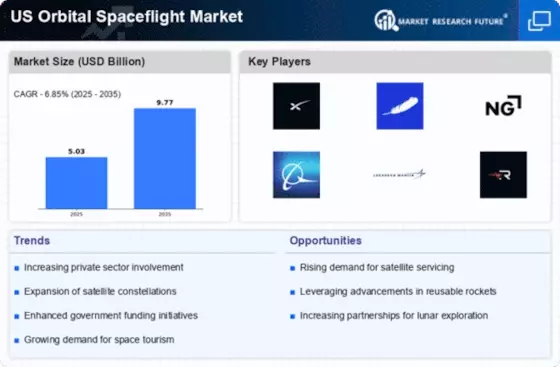Technological Advancements
The US Orbital Spaceflight Market is experiencing a surge in technological advancements that enhance the capabilities of spacecraft and launch systems. Innovations in propulsion systems, materials science, and automation are driving efficiency and reducing costs. For instance, reusable rocket technology, pioneered by companies like SpaceX, has significantly lowered the cost per launch, making space more accessible. The National Aeronautics and Space Administration (NASA) is also investing in next-generation spacecraft, such as the Orion Multi-Purpose Crew Vehicle, which is designed for deep space exploration. These advancements not only improve mission success rates but also attract private investment, further stimulating growth in the US Orbital Spaceflight Market.
International Collaboration
International collaboration is emerging as a significant driver in the US Orbital Spaceflight Market. Partnerships between the US and other nations, such as the Artemis Accords, facilitate shared missions and technology exchange. These collaborations enhance the capabilities of US companies and expand their market reach. For example, NASA's collaboration with the European Space Agency (ESA) on the Orion spacecraft exemplifies how joint efforts can lead to technological advancements and cost-sharing. Furthermore, international partnerships can help address global challenges, such as climate change, by enabling joint satellite missions for Earth observation. This trend is likely to strengthen the US Orbital Spaceflight Market by fostering innovation and expanding operational horizons.
Emergence of New Market Players
The emergence of new market players is reshaping the landscape of the US Orbital Spaceflight Market. Startups and established companies alike are entering the space sector, driven by advancements in technology and decreasing launch costs. Companies such as Rocket Lab and Relativity Space are innovating with new launch vehicles and manufacturing techniques, which are diversifying the market. This influx of competition is not only driving down prices but also accelerating the pace of innovation. The presence of multiple players encourages collaboration and knowledge sharing, which can lead to breakthroughs in space technology. As these new entrants continue to develop their capabilities, they are likely to contribute to the overall growth of the US Orbital Spaceflight Market.
Government Policy and Regulation
Government policy and regulation play a crucial role in shaping the US Orbital Spaceflight Market. The Federal Aviation Administration (FAA) is actively working to streamline the regulatory framework for commercial space launches, which is expected to encourage more private sector participation. Additionally, the US government has established initiatives such as the Space Policy Directive-1, which aims to promote human exploration and commercial activities in space. These policies not only provide a clear roadmap for industry stakeholders but also foster a competitive environment that attracts investment. As regulations evolve, they are likely to create new opportunities for growth within the US Orbital Spaceflight Market.
Increased Demand for Satellite Services
The demand for satellite services is a key driver in the US Orbital Spaceflight Market. As industries such as telecommunications, agriculture, and environmental monitoring increasingly rely on satellite data, the need for launching new satellites has escalated. According to the Federal Communications Commission (FCC), the satellite industry is projected to grow significantly, with revenues expected to reach over $100 billion by 2025. This growth is prompting both government and private sector investments in launch capabilities. Companies like OneWeb and Amazon's Project Kuiper are planning large constellations of satellites, which will require frequent launches, thereby bolstering the US Orbital Spaceflight Market.
















